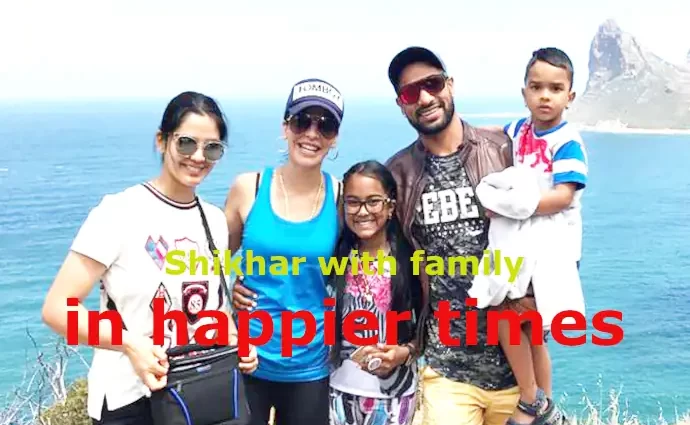It has been a matter for public record now for some time that Shikhar Dhawan’s marriage with Melbourne based Indian Australian Aesha Mukherjee ended back in 2020. But in the media, this Shikhar Dhawan divorce drama goes on.
While wife Aesha filed for maintenance in the Family court in 2021, Shikhar has knocked the doors of Indian courts filing for divorce (and financial settlement ?) and access rights to his son Zoravar, perhaps not to Aesha’s liking.
The Indian media reported Shikhar was not happy with the amount of money he was paying and the time he was spending with his son Zoravar, who lives with his mother Aesha in Melbourne.
Shikhar wants his son to come to India regularly and meet and bond with him and Shikhar’s family.
Aesha, on the other hand, as reported by the media, claimed Zoravar’s education would suffer and thus could not make arrangements in time for the dates Shikhar wanted him in India.
Thus he approached the courts in Delhi making various applications, (including one for divorce), where he has succeeded in getting relief (access to his son) he sought, perhaps making his ex-wife Aesha unhappy.
While hearing the matter, the lawyer for Aesha submitted to the court that the matters had been dealt with appropriately by the courts in Australia and pointed to the remarks made, much to the ire of the judge.
According to sources, the judge in Delhi was told that the court in Australia had suggested that Dhawan should submit himself to its jurisdiction in Australia and withdraw petition filed in Family Court in Delhi.
That did not make the judge happy at all.
The Patiala House Court opined that foreign courts should shed the attitude that courts in India are still in the pre-independence era.
“Indian Court are conducting its proceedings through video conference, wherever, such is the requirement. It is to be borne in mind that India got its independence in 1947 and since then it has made tremendous improvement in application of technology in all walks of life. Hence, no one should remain under misconception that Indian Courts are still in pre-independence era,” the judge said.
It has been reported that the Australian judges felt it was not clear how Indian Courts function and adjudicate parenting disputes or custody matters and thus suggested that since both the parties understand English, they can continue to pursue their litigation in Australia instead of India as the former uses video conferencing.
Taking objection to above, the Patiala House Court has said that the statements reflected an “inappropriate understanding of the law of India qua parenting and conditions prevalent in India.”
Special Judge, Harish Kumar spoke about the jurisprudence the Indian Court follow in dealing with Custody and Divorce matters and asserted that the same is fair for everyone involved and yet keeps child’s interest ‘paramount’.
“The paramount consideration in such petition has always been the best interest of the child. Hence, to say that since it is not known to Australian court as to how parenting disputes are determined in India, therefore, court in Australia would have better jurisdiction is nothing but reflection of inappropriate understanding of the law in India,” the order said.
He further underscored the unawareness of the Australian Judges regarding the operation of Indian Courts in terms of language.
“Almost all courts in India, particularly courts in New Delhi conducts its proceedings both in English as well Indian language prevalent. Hence, respondent herein would not have any difficulty in understanding and participating in the proceedings in India,” the judge stated.
Taking charge of Shikhar Dhawan divorce application, Judge Kumar held the view that choosing Indian jurisdiction would be better for the parties since they are Hindus and marriage is solmenized as per the Hindu Marriage Act 1955.
“Marriage between the parties was solemnised in New Delhi in accordance with Sikh rites, governed by Hindu Marriage Act, 1955. Their marriage was registered in India. All marriages performed in India under Hindu Marriage Act has to be dissolved under Hindu Marriage Act, 1955 by courts in India or by foreign court applying Hindu Marriage Act provided both parties have subjected to the jurisdiction of foreign court,” the judge observed.
He also expressed strong opinion on the Australian Court restraining Dhawan in view of Ayesha’s amended plea, that she only filed after Patiala Court passed orders touching upon parenting and custody issues.
“The court in Australia respecting Indian Law, Indian courts and taking into the account that all matrimonial dispute between parties is governed by Hindu Marriage Act, should not have restrained the petitioner (Dhawan) herein. Be that as it may, since order of the court in Australia reflects clear non-recognition of Indian law and of other factors prevalent in India, therefore, he is not bound by the order directing him not to proceed with parenting proceedings before this court in India,” the Judge said.
A lot more to come on Shikhar Dhawan divorce. Stay tuned.
Similar Posts by The Author:
- Dowry harassment in Australia? Report it in Australia NOT in India says Punjab and Haryana High Court
- International Students: Why Australia doubled Visa application fees
- False promise of marriage: Courts should ensure law is not misused against men
- Hats off to Asaduddin Owaisi, to invoke Palestine in oath-taking
- Arvind Kejriwal release stuns many: ‘Sir Ji’ gets regular bail

